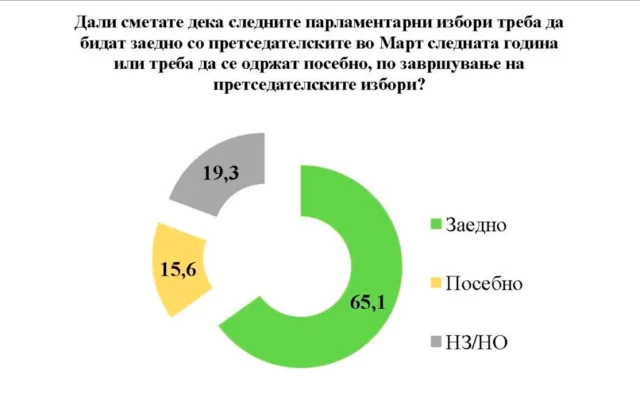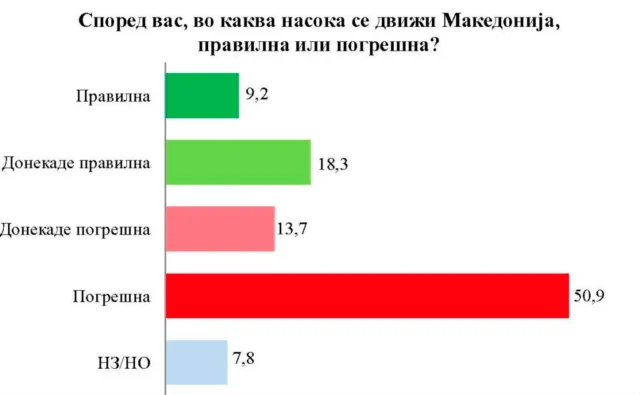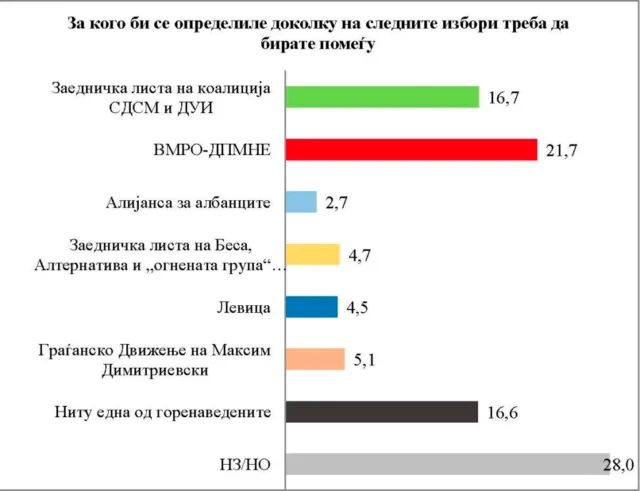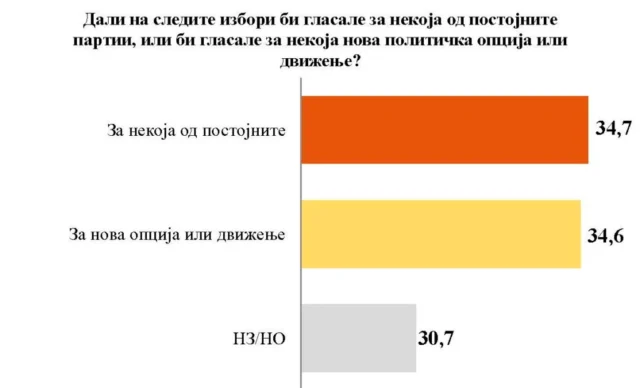Macedonia is predominantly prepared for elections, with clear views regarding the government and the opposition, and dissatisfied with the current government, regardless of the ethnicity of the respondents, and the public.
Commissioned by Vecer.mk portal, the poll was conducted by IPIS Skopje, an expert institution that conducts most polls in Macedonia with respectable accuracy, and shows that the rating of the ruling parties SDSM and DUI continues to decline.
The announced option that, due to the drop in ratings, SDSM and DUI could participate in a pre-election coalition in the next elections, according to the citizens of Macedonia, is not a winning combination for them. On the contrary, even if they perform together, the opposition VMRO DPMNE has almost a 25% higher rating than the ruling coalition.
Should the presidential elections be held together with the parliamentary elections, since they are close to the regular dates, or should voting be done separately for the Parliament and the president of the state as planned by SDSM and DUI? The poll overwhelmingly says that both votes should be held on the same day:
How satisfied are the citizens with the current government? A key question for determining the public attitude in relation to the government that disposes of their money and interests. International reports confirm the public perception of high corruption in the government, control over the judiciary, ethnic tensions and a decline in security, as well as the security and standard of citizens and companies.
The results of the poll on this question say that more than half, or 50.9%, think that Macedonia is going in the wrong direction, and an additional 13.7% think that the country is going in a somewhat wrong direction, which, together, means that almost two-thirds, or 64, 6% of citizens think that Macedonia has a wrong government policy.
In such a situation, who does the public consider as a solution to change the ruling policy and return Macedonia to a path that is stable, democratic, a path to a legal state and an economic perspective. The public shows by far the greatest trust in the opposition VMRO DPMNE with the support of 21.7%.
SDSM and DUI, parties that make up the government in Macedonia, supported by several small parties in order to ensure some kind of majority in the Parliament, after two years of permanent decline in ratings, announced the possibility of a pre-election coalition that, together, would oppose the opposition VMRO DPMNE. However, the public believes that even together they are far from the support of the largest opposition party, so even in such a combination they would be convincingly defeated in the next parliamentary elections with a large margin of 60-70,000 votes in favor of VMRO DPMNE.
The comparison of two smaller parties that attack the votes of SDSM and the undecided is also interesting: Levica and the Civic Movement of Kumanovo of Mayor Maksim Dimitrievki, colloquially referred to in the media as the movement For Our Macedonia.
Namely, Maksim Dimitrievski has slightly greater support in the public than Dimitar Apasiev and Levica, which is the result of the experience the public has from the results as the mayor of Kumanovo and the field work of this Citizen’s movement throughout Macedonia, in contrast to the activity of Levica dominantly on the social networks and without concrete results on the ground and in the municipalities where they have advisers.
Maksim Dimitrievski already has a rating of over 5% in the polls, and the activities on the ground among the citizens are yet to follow. Levica activities only on Facebook and Twitter obviously cannot pass that 5% limit, and their politics are increasingly radical. The rapprochement of Levica with DUI and SDSM in several municipalities, primarily in Skopje, shows a drop in their rating.
Are citizens looking for new faces in politics? Opinions are divided, but the trend of offering new faces in political life is growing, according to the public’s interest in them.
The poll commissioned by the news portal Vecer.mk was conducted by IPIS Skopje, in March 2023, on 1114 respondents in proportion to the age, ethnic and gender composition of the population in Macedonia.









Comments are closed for this post.